The New Wave of British Heavy Metal was a remarkable thing; Fuelled purely by the love for a style of music largely derided outside of it’s followers and practitioners, spurned in the most part by the wheels of big business as manifested by the major record labels, largely hated and laughed at by the media, the soldiers of metal who formed a legion in Shakespeare’s sceptered isle forged a legacy far beyond what anyone might have imagined possible in 1983. And today our Classics: Track-By-Track series takes us to the sleepy Cathedral city of Salisbury, in 1983, where one of the greatest British metal albums of that or any other time was taking shape – Tokyo Blade’s self-titled debut album…
Andy Boulton, one of the founding members of the ‘Blade, is revving up his memory as we start to reminisce about this great album. I kick off by inviting him to do a bit of scene-setting… What was the mood like in the band as you came to record the album. And how had you hooked up with the Powerstation label? Had you sent many demos out? “Well, yes and no… We’d done the usual thing you did back in the day – get on the train, hit up all the record labels in London. We went round to every major label and every minor label we could think of and gave them a demo. Which they never listened to – they just go into a big bin! You get a bit despondent. The breakthrough for us came after we’d decided to record our own four track single, called Double Dealin’ (which was released under the band’s original name, Genghis Khan – Ed). Those tracks were If Heaven Is Hell, Highway Passion, Midnight Rendezvous and Meanstreak. We’d saved up our pennies and gone into a studio, recorded the single. As luck would have it, the DJ Tommy Vance, who presented the BBC’s Friday Rock Show on the radio, was opening a nightclub at Longleat Safari Park, which was quite near where we lived. Every Friday night they were having a rock/metal night. So we went up there, took the single and tried to get him to play it. There he was, in the DJ booth, and I gave him the single and asked him if he’d play it. He took it off me, put it down and continued chainsmoking. I thought ‘oh no, here we go again’. So I asked him again if he’d play it. He looked at me and said ‘if I like it, mate, I’ll play it’… So we tuned in to the Friday Rock Show the next week and he didn’t play anything. So we thought ‘oh well, fair enough. He didn’t like us’ and got on with other things. But then our manager rung us the next week – he’d been on the phone to the show’s producer, Tony Wilson – and they were going to play all four of the tracks on the show that night! And he did! That led on to a live session we did for the show. The record label Powerstation heard it, which led to us doing a show for them at The Ruskin Arms in The East End of London, Iron Maiden’s old stomping ground. The show went well, they liked what they heard so they signed us!”
It’s hard for people in this day and age to get their heads around the fact that a country the size of the UK only had one weekly national two-hour show featuring rock and metal in 1983! It’s almost impossible to emphasise how important those two hours were. “Absolutely. Anybody today would just lob a few tracks on YouTube! But in 1983, that’s what we had to cling on to – The Friday Rock Show! There wasn’t really any real independent radio coverage at the time, so getting on the Rock Show gave the band a real confidence boost. Radio 1 had played our tracks!”
So, you signed to Powerstation. Time to do the album! Let’s have a look at it in it’s original track-by-track order. “Can I just begin by giving a general overview of the recording process?” Of course! Fire away. “Powerstation had booked us in to what must have been the cheapest recording studio they could find – Wickham Studios in Croydon, where the engineer was the tea boy. The record company said ‘you’ve got four days’. We said ‘for what?’. They said it was for recording. When we asked about mixing they said that was included in the four day recording time! We tipped up at the studio on the first day at eight in the morning. Every day we worked until two in the morning, got the sleeping bags out, slept on the studio floor and then got up at eight and started again. There was no time for retakes or anything. And we lived off of chip sandwiches!”
Sounds appetising! On to the album. Track one is Powergame. “Alan (Marsh, vocals) and I basically wrote the whole album. John Wiggins (guitars) came in with a couple of things, some riffs, but for the most part all the songs on the album were things Alan and I had built up over a period of time. Powergame was decided as the opening track, and I seem to remember that it was the first song we recorded because it was the song we were most comfortable with. John Wiggins will tell you himself that he can be a bit hamfisted at times, and somehow he managed to break the mixing desk before we’d recorded anything, whilst the engineer was sorting out the drum kit! He’d seen the guy pushing the talkback button on the desk to tell Steve (Pierce, drums) that there was a bit of a ring on the tom toms, or whatever… so when he went in to fix it John thought it would be a good idea to push the talkback button to speak to Andy Robbins, our bassist, who we always called ‘knob’. He pushed the button down to say ‘knob, you’re such a wanker’ but in fact pushed down the little condenser mic that sticks out of the desk. It had fallen through inside the desk. We spent the rest of the session with the engineer talking into what was now a small hole in the mixing desk and hoping the guys in the recording room could hear what he said, which was interesting! There’s not much else to say about the song really”.
What gear were you yourself using? As an outsider one of the things I loved about the album at the time was the heaviness of the sound, the rawness. You note you were in a cheap studio, but as a fan, in 1983, Saxon had gone to America to record, Maiden and Judas Priest were getting glossier… this was still real heavy metal. “You’re absolutely right. Everything that we had – everything we’ve always done – was always on the cheapest possible budget. We’ve never had any money! Back then John and I had two master volume Marshall Amps. They were Ok, but still only really gave you a Rolling Stones-type distortion even when they were whacked up full. John had a kind of circuit thing that somebody had built into his guitar for him. If you switched it on it was like a pre-amp or a booster. It gave him a ‘fizzy’ but quite heavy sound. So I got a friend of mine who was into electronics to rip off the circuitry that John had, so I had the same in my guitar. So that was all we used to get the guitar sounds. Andy’s drum kit was a Tama Imperial Star, the same as Brian Downey from Thin Lizzy used, quite new. I think Andy used whatever was in the studio for his bass. With an Ampeg amp, maybe. And none of us really used any pedals”.
The thing that really hits you even now is how heavy it sounds. For a primitive recording it sounds great I think. “The funny thing about it is… I have a modest home studio where we just recorded our latest album Dark Revolution. When Steve Pierce was over recording his drum parts he said to me ‘now that we can get a good sound, why don’t we pull some of the better tracks off of the first two albums and re-record them?’ I thought it would be a good idea, so to test the water I got the lads who run our Facebook page to put something up asking the fans what they thought about It. Everybody said no! Do not touch them! We were quite shocked because we thought people would love to hear songs like Powergame and Sunrise in Tokyo brought up to date, but the majority didn’t like the idea. That says something. I’m just not sure what!”
Track two is Break The Chains. “John came up with the opening riff for this one. We spent a lot of the time at the time at Alan’s house, because he was the only one who was married and had a house! My parents were incredibly supportive and we could have done it at their house but Al’s really was our HQ. John would often come down from London to Salisbury, and one day he came down with this riff which we liked and took and Break The Chains was born. It’s one of my favourites and up until recently it’s always been kept in the live show. It’s got that riffy intro that people dug”.
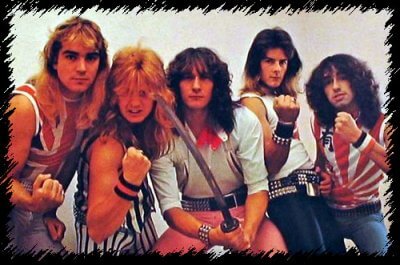
Next up: If Heaven Is Hell. “Alan and I got together three times a week to write songs. Some of them never progress. Right up until the 1995 reformation album, Burning Down Paradise, the way we wrote was comical. All we had was an old cassette recorder that was basically knackered. Alan had to hold the mains lead at a certain angle before it would work. When the red light finally came on he would press ‘play’ and ‘record’ and I would play various riffs or ideas. When you do that under those circumstances you have no bass, no drums, no vocals, it’s just a guitar riff. So in your head is all that other stuff and what would often happen was that you would revisit the songs a week later. But by then whatever was in my head to go along with the riffs was gone. Alan would ask me what a riff was that he liked and I’d have no idea. So he started calling me ‘Mr. Disposable’. He was getting really frustrated. But part of my personality is that once I’ve finished something, I tend to move on. So If Heaven Is Hell was written under those circumstances. We were influenced, as Maiden were, by UFO and Thin Lizzy. They were probably our main influences, with a smattering of earlier stuff like Deep Purple and Led Zeppelin. And we wanted a sort of (hums a sort of galloping riff) kind of thing. We weren’t sure how to start it but I was pissing round with an acoustic guitar and I played a crappy, pseudo-flamenco thing which we ended up using! It wasn’t recorded at Wickham Studios, which you can tell when you listen to the album. It was recorded with a better budget (Stable Studios in Wiltshire, UK – Ed). The hooky guitar line in the middle… I don’t know sometimes where these things come from. They are not works of genius! We both like the harmony guitar thing so we added that to that part… there’s a little break in the middle. We always like songs that had those breaks in them, they keep things interesting I think. I remember when we finished writing it I turned to Alan and said ‘it’s another epic’. We’d never written a three minute song!”
Having explained that you’re very much an ‘in the moment’ person, do you have to get up now and record things as soon as they come into your head? “Straight away. I sometimes get up in the middle of the night, switch everything on and whack it down. I even do it while we’re recording. I might have a whole song, which just needs a solo, maybe come up with something else that might go well in a solo and I’ll just record it for reference because after that it’s out of my head while I think about the rest of the solo. Generally I just play a solo in one take – if it does what it’s meant to do that’s it. I don’t over stress about solos. There were only a couple of solos on the first album that were definitely constructed. I’m from the Eddie Van Halen school of winging it!”
I’m glad you mentioned him. Because if anyone was to ask me about the Tokyo Blade sound (not that anyone would) I’d describe it as ‘Maiden meets Van Halen’. “Yes. The game changer for me was when I was between fourteen and eighteen money was quite tight and I had the most hideous paper round. People still comment on my calves and it’s because I used to cycle about twenty miles a day before school delivering fucking newspapers! But it gave me money to buy albums, and I used to buy albums judged on the covers. Every couple of weeks I’d have enough money to buy an album and I’d go into Salisbury’s record shop. One day I picked up Van Halen 1. They looked like they might kick some ass on the cover! The record shop had a listening booth so I took it in. I listened to half of Running With The Devil, decided it sounded good enough to buy so I took it home. Then I heard Eruption and thought ‘what the fuck is he doing’! I saw them when they came to England on the Women And Children First Tour, and when I saw him doing the tapping it all made sense! That was something that became a big part of my playing. I don’t do it so much now, but it was a thing for the time, and I loved all of the Van Halen albums until Sammy Hagar came in. Not because he isn’t a great singer, because he is, but I just felt they lost a bit of their mojo”.
We’ve drifted off topic… Next track is On Through The Night. “I don’t even know how that song made it on to the album. We didn’t really like it. Well, I didn’t really like it. Perhaps if Al reads this he’ll say ‘what are you talking about?’ (laughs)… I was never keen on it. I don’t know what it was about it but it just didn’t do anything for me. I felt we’d left out songs that were better, frankly. Back in the day, when an album was done, it was on vinyl. There were no CDs. And on vinyl you have a finite amount of time. The maximum you’ve really got is about twenty two and a half minutes a side before the quality suffers. There was always a bit of a fight about what was going on the album and what wasn’t for that reason. I remember thinking that I wasn’t chuffed with the song at all. I’ve no real reason!”
Was it in the live set at the time? “I think it was. We didn’t have that much of a live set. We’d only just started gigging as a ‘play your own numbers’ band. For years we’d done covers to try and earn money to buy better gear, but I think it would have been in the live set. It’s just a song I was never keen on”.
We’ll move on then. Killer City kicked off side two. “This was one I was definitely up for going on the album. Alan has a great thing with lyrics and melodies. He puts a hell of a lot of thought into them. I know a lot of people don’t really pay attention to a song’s lyrics, which is a shame in a lot of ways. A lot of Alan’s meanings are missed, but it all means something to us at the end of the day. Killer City started off as more of a condemnation of the way that big cities can suck the life out of people. Living in a big city isn’t really a natural way to live. That’s how it started off, then people went with it being about a Jack The Ripper kind of thing, but it didn’t start out like that. Another one that Alan and I came up with”.
What about Liar? What do you remember about that? “The album version was the song’s third version. It was actually the song that we first recorded in any way. Alan’s parents went away on holiday, so we moved in and set up the drumkit in the sitting room, the vocals in the kitchen and the guitars in the living room. We ran miles and miles of cables through the house and into an old mixing desk a friend of ours owned and onto the cassette recorder! It was the roughest demo you’ve ever heard. That song changed about two or three times before the version you hear on the album. I always liked it, and was pleased it got on the album. There is a story behind the lyrics, but I can’t quite remember the facts. But it was about someone we knew who was a bloody liar!”
The next track has always intrigued me. How and why did a Russ Ballard song get on a Tokyo Blade album? “Oh God! A guy from the record company, who shall remain nameless, was a prat. He fancied himself as a producer. He popped in and out a lot while we were recording. It was just after Rainbow had had a hit with I Surrender, which was written by Russ Ballard, and record company man said ‘you’ve got to put a cover version on the album’. We definitely didn’t want to. We had our own songs and like I said the vinyl space was limited. But they held the purse strings and that’s what they wanted. They played us this horrible song. Russ Ballard is a great songwriter who has written some amazing songs… but even his version of Tonight was mediocre in my opinion. And ours was murder! And that’s all I can say about it really. Warrior Of The Rising Sun, which appeared on Night Of The Blade, was already written and could have gone on the album but they really, really wanted this on. He probably go the publishing from it at the time!”
I really loved it at the time! “And nobody has really come up to us and said anything bad about it! But I just assume people are being kind!”
In 1983 you are coming out of that period when there was barely a week passing when a metal band wasn’t on Top of the Pops. There were plenty of hit singles flying around in metal at the time. “Yes, and I got the idea. And we’d have probably been up for it if the song was as good as I Surrender. Or Since You Been Gone. We were even offering to do cover versions of other songs but he had a bee in his bonnet about this one”.
Last track: Sunrise In Tokyo. “That’s a constructed solo! I actually wrote the solo before I wrote the song. We were sat at Alan’s as usual. He disappeared and I was sat in an armchair with a guitar in my hand. I had a chord progression, which I played. I thought it would work as a solo section or a middle eight. I decided to work out a tapping part that would work over the top. At that time I played everything by ear – I didn’t know any musical theory at all. It was only years and years later, when I got into teaching guitar that I learned all my music theory. Anyway, as I say, I wrote the solo first. We did have the opening riff, because Alan had just bought the first Dio album, Holy Diver. It opens with that fantastic riff from Stand Up And Shout, and we were after that kind of riff. So that’s how it came about. When Alan came back I showed him what I’d come up with while he was out. Alan went away and wrote some lyrics. We work differently now. Now I have a home studio I will write a complete song – drums, bass as well; if he thinks it’s up to the mark he’ll take it away and work up some lyrics and melodies and bring it back to me to record the vocals. The song has a title and you know how it goes because it has a vocal on it… Back in the day we didn’t even know what a song’s title was when we were working it out, we didn’t know what the vocals were until we were recording them, because Al never used to tell us. I don’t know whether he had a reason for that. We always would say ‘the song that starts like this’ when we were rehearsing them. Anyway, he came up with the lyrics and title for Sunrise In Tokyo, which suited the general themes of the band – rising sun, Tokyo et cetera, so we put it down. It was the penultimate song we recorded for the album”.
Talking of which – why did you record The Blue Ridge Mountains of Virginia as the last track on the album. “Because Alan and I are the biggest Laurel and Hardy fans (laughing)! I’ve got the box set on VHS and DVD. I defy anyone to watch a Laurel and Hardy classic and not laugh, although funnily enough my last girlfriend… I was watching the film Berth Marks with tears streaming down my face. I was having trouble breathing because I was laughing so much! I turned round and she was watching it, stony-faced. I said ‘did you not find that funny?’ and she said ‘no, it’s stupid’. That’s kind of the point! But anyway that’s why we recorded it. The person playing piano on it is the guy from the record company!”.
Last question, and it’s a question we always close with, even though I think I can tell by talking to you for an hour what the answer will be – do you look back at this time with the band fondly? “Yes, Because we were young, full of beans and energy, very naïve. You have to take the positives out of life. As they say, if it doesn’t kill you, it only makes you stronger. And I think that sums Tokyo Blade up as a band. We’ve always laughed things off, whenever something goes bad – which is loads… That’s how we’ve always been”.
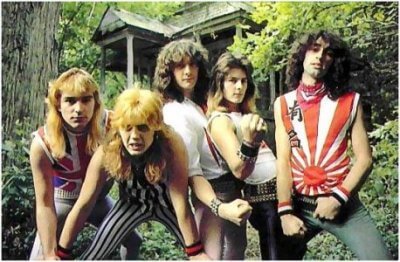


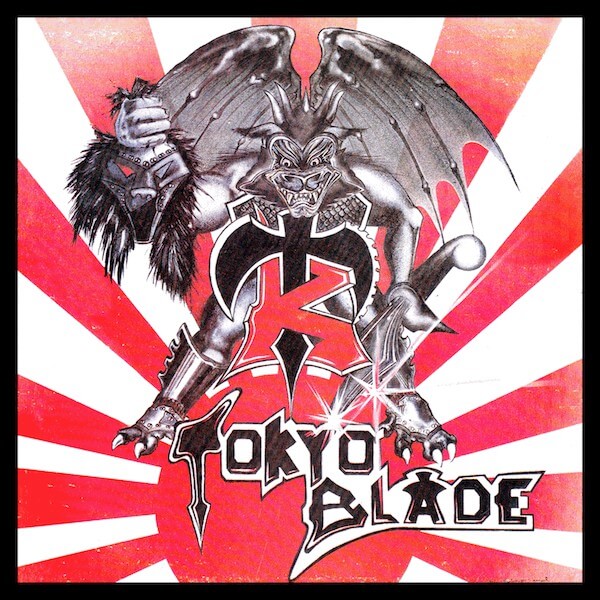
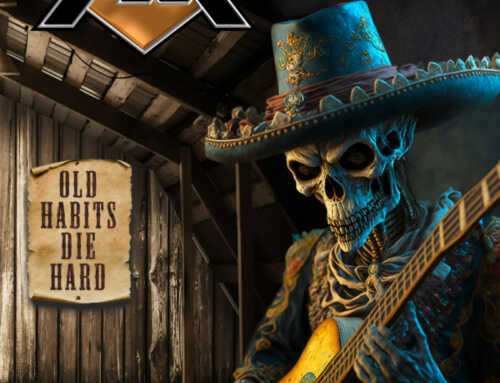
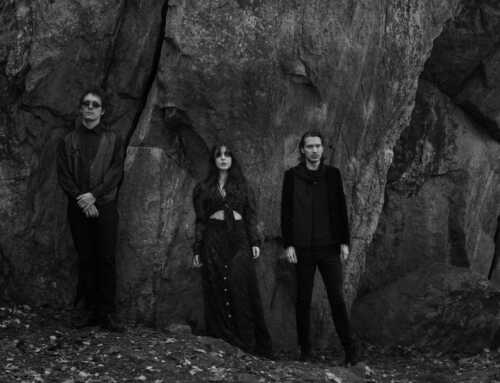
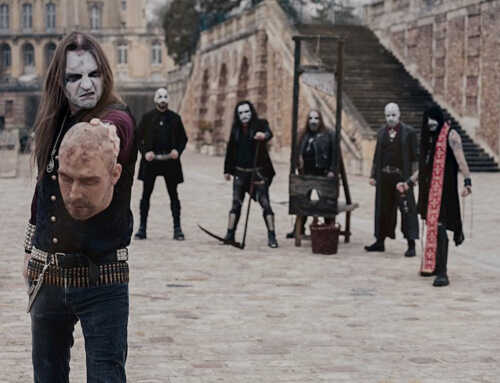
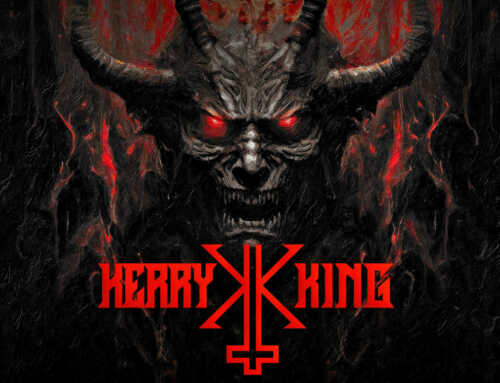
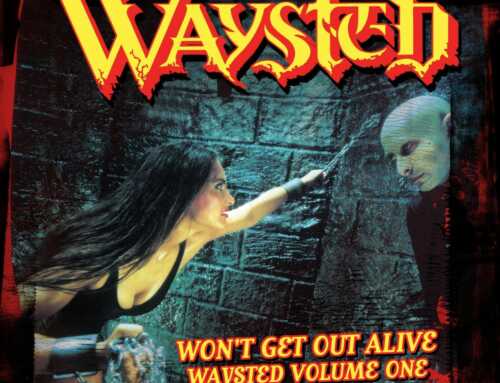
Leave A Comment